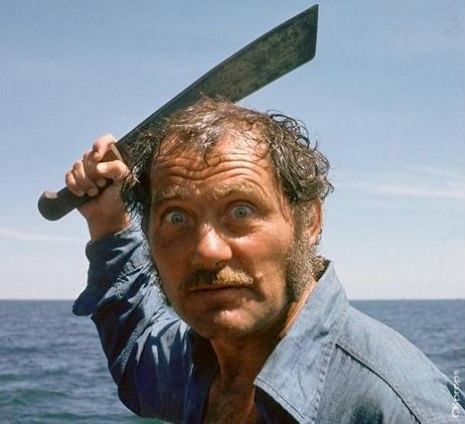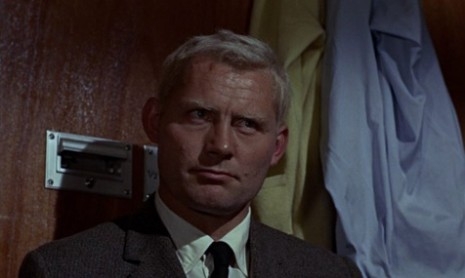
Robert Shaw liked to drink. Indeed, the actor, author and playwright liked to drink a lot. And it often led to some disastrous consequences.
During the making of Jaws, Robert Shaw had an alcohol-induced blackout during the filming of that famous S.S. Indianapolis speech. Shaw had convinced director Steven Spielberg that as the three characters in the scene (played by Shaw, Roy Scheider, and Richard Dreyfuss) had been drinking, it might be an idea to have a wee chaser before filming, just to get him in the mood. Spielberg agreed. It was an unwise decision as Shaw drank so much he had to be carried back onto the set. Hardly any filming took place that day, and Spielberg wrapped the crew at eleven in the morning.
Later that night, in the wee small hours, a panicked Shaw ‘phoned Spielberg to ask if he had done anything embarrassing as he could not remember what had happened. And would the director let him film the scene again?
The next day, a sober and contrite Shaw turned up early for work and delivered one of cinema’s most memorable speeches.
“Drink?” Shaw once famously said in 1977, “Can you imagine being a movie star and having to take it seriously without a drink?”
“I agree with Richard Burton that drink gives poetry to life. Drink for actors is an occupational hazard born largely out of fear.”
The stories of Shaw’s alcoholic excesses, often abusive behavior, and on-set pranks can sometimes overshadow his quality as an actor and his talent as a writer. The academic John Sutherland has pointed out Shaw was a far better writer than many of the best-selling authors whose books inspired the films he starred in, particularly Pete Benchley (Jaws, The Deep) and Alistair MacLean (Force 10 From Navarone), though sadly none of Shaw’s five novels or his three plays are currently in print.
As we all (probably) know, Shaw himself was involved in the writing of the famous Indianapolis speech, as Spielberg has explained in 2011:
I owe three people a lot for this speech. You’ve heard all this, but you’ve probably never heard it from me. There’s a lot of apocryphal reporting about who did what on Jaws and I’ve heard it for the last three decades, but the fact is the speech was conceived by Howard Sackler, who was an uncredited writer, didn’t want a credit and didn’t arbitrate for one, but he’s the guy that broke the back of the script before we ever got to Martha’s Vineyard to shoot the movie.
I hired later Carl Gottlieb to come onto the island, who was a friend of mine, to punch up the script, but Howard conceived of the Indianapolis speech. I had never heard of the Indianapolis before Howard, who wrote the script at the Bel Air Hotel and I was with him a couple times a week reading pages and discussing them.
Howard one day said, “Quint needs some motivation to show all of us what made him the way he is and I think it’s this Indianapolis incident.” I said, “Howard, what’s that?” And he explained the whole incident of the Indianapolis and the Atomic Bomb being delivered and on its way back it was sunk by a submarine and sharks surrounded the helpless sailors who had been cast adrift and it was just a horrendous piece of World War II history. Howard didn’t write a long speech, he probably wrote about three-quarters of a page.
But then, when I showed the script to my friend John Milius, John said “Can I take a crack at this speech?” and John wrote a 10-page monologue, that was absolutely brilliant but out-sized for the Jaws I was making! (laughs) But it was brilliant and then Robert Shaw took the speech and Robert did the cut-down.
Robert himself was a fine writer, who had written the play The Man in the Glass Booth. Robert took a crack at the speech and he brought it down to five pages. So, that was sort of the evolution just of that speech.
More on Robert Shaw, after the jump…






